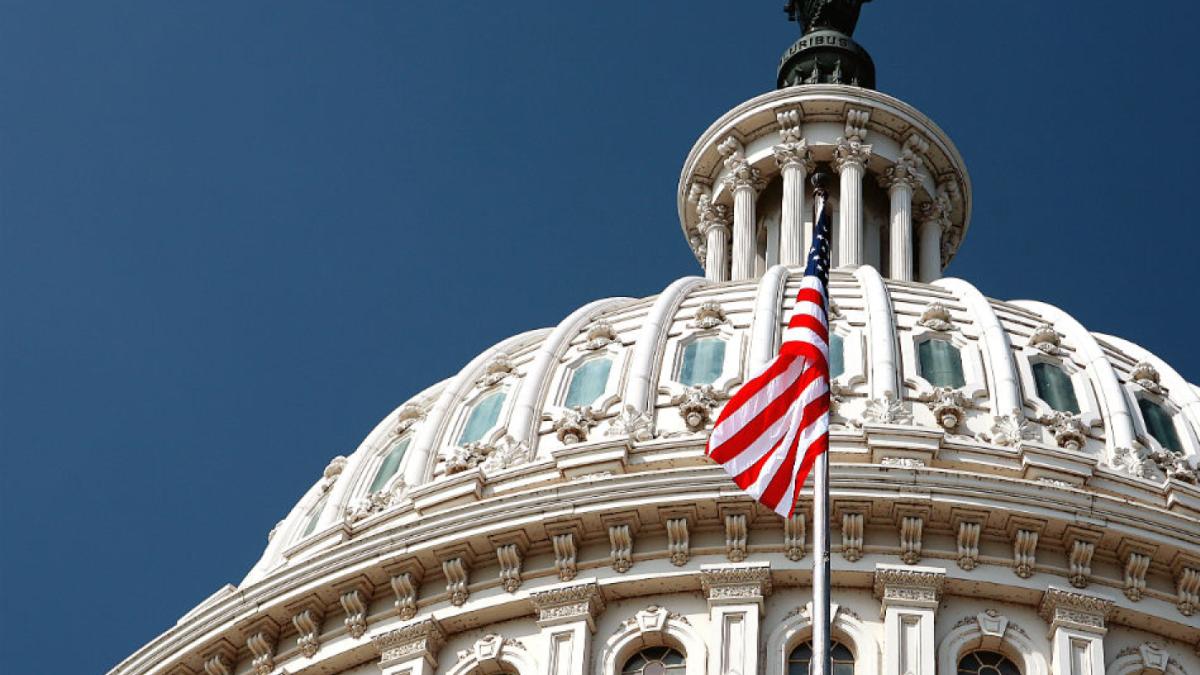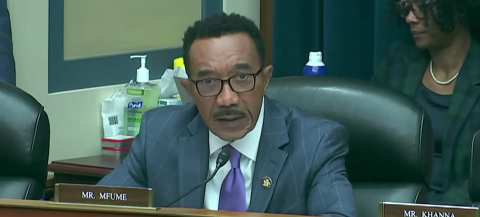
South Baltimore residents and environmental justice groups seek an EPA permitting system to require railroad cars carrying coal to be covered so that coal dust from the trains does not pollute their communities.
WASHINGTON, D.C. – Today, U.S. Congressman Kweisi Mfume (D-MD) questioned Environmental Protection Agency (EPA) Administrator Michael S. Regan regarding the ongoing coal dust contamination taking place in South Baltimore as a result of coal dust flying from railroad cars transporting millions of tons of coal through Curtis Bay. EPA Administrator Regan appeared before the U.S. House Committee on Oversight and Accountability, where Congressman Mfume serves as the Ranking Member of the Subcommittee on Government Operations and the Federal Workforce.
Specifically, Congressman Mfume asked Administrator Regan about a September 26, 2023, petition seeking to have railroad cars carrying coal covered (“the Petition”). But there has been no formal action on the Petition by the EPA to date. Congressman Mfume penned a June 21, 2024, letter in support of the Petition and rulemaking process.

"There is no dispute that large sums of coal dust flies from uncovered railroad cars and the coal dust comes to rest in our waterways, as well as on cars and in the lungs of human beings. My constituents, who live next to and around the Curtis Bay terminal, live with this contamination and struggle to breathe clean air. The Curtis Bay neighborhood suffers from high levels of coal dust pollution transported through their community. We cannot idly sit by and let this grave case of environmental injustice continue unabated," said Congressman Kweisi Mfume.
"Coal dust from uncovered railroad trains is an undeniable health threat to thousands of Curtis Bay residents and others who are forced to fight for clean air and water every day as a result of this threat. Our youth, adults and older adults in Baltimore City’s 10th Councilmanic District experience visibly high levels of coal dust pollution in the water, on the playgrounds, on the streets, and in their homes. This injustice must end,” said Baltimore City Councilwoman Phylicia Porter. “The South Baltimore communities I represent have battled environmental hazards for decades, advocating tirelessly for their basic human right to clean water, breathable air and healthy living conditions. I am grateful for the collaboration with Congressman Mfume as we demand environmental justice accountability from the EPA. Protecting our health is not just a necessity, it is a fundamental human right that we must uphold,” she added.
"The South Baltimore Community Land Trust, along with its allies and all affected communities, calls for unity in protecting basic human rights. Congressman Kweisi Mfume's letter to the EPA marks one of the initial steps in advocating for equitable solutions to shield communities from exposure to coal dust from uncovered railcars. Achieving federal, congressional, state, and local support to end environmental injustices is crucial in addressing historical environmental inequities that prioritize profit over people in communities like South Baltimore. We are eager to collaborate with leaders at all levels of government to lead efforts in safeguarding lives and building communities we can take pride in," said Dr. Meleny Thomas, Executive Director, South Baltimore Community Land Trust.
“In Baltimore City alone, nearly 130,000 people live within .3 miles of uncovered coal trains passing by their homes en route to the uncovered piles of coal at the CSX export terminal in Curtis Bay. Covering the coal is a long overdue step for environmental justice that will provide immediate relief for residents across the country forced to pay the health costs of breathing in hazardous coal dust. We are hopeful that Congressman Mfume backing the community’s call will inspire needed action by the EPA and officials at all levels to protect our health and community’s ability to thrive," said Greg Sawtell, Co-President, Community of Curtis Bay Association.
Full text of the letter can be viewed here and below.
June 21, 2024
The Honorable Michael S. Regan
Administrator
U.S. Environmental Protection Agency
Dear Administrator Regan:
I write this letter in support of the September 26, 2023, Petition for Rulemaking submitted by South Baltimore Community Land Trust, Public Justice, Appalachian Mountain Advocates, and several other petitioners (“the Petitioners”) to Establish a Nationwide National Pollutant Discharge Elimination System Permit for Uncovered Railcars Transporting Coal, Pursuant to 33 U.S.C. § 1342(a).
As you know, millions of tons of coal are transported by rail in the United States every year. Due to wind erosion, coal railcars act as point source discharges of pollution, depositing harmful coal dust into the many streams, rivers, other waterways, and communities within proximity of train tracks. These coal and coal dust discharges pollute our nation’s waterways, leading to disastrous effects on aquatic ecosystems across the country. More specifically, fine coal particulates (i) inhibit the ability of aquatic plant life to photosynthesize and grow and (ii) harm gill-breathing marine life. This kind of pollution occurs from the west coast to the east coast, creating adverse health outcomes for families close to the point source discharge of pollution.
My constituents who live next to and around the Curtis Bay terminal, which is the second largest coal export terminal in the nation, struggle to breathe clean air. The working class, majority Black and brown Curtis Bay neighborhood suffers from high levels of coal dust pollution blown from uncovered railcars. A study led by the Maryland Department of Environment and the South Baltimore Community Land Trust confirmed the existence of Particulate Matter 2.5 (PM2.5) and Particulate Matter 10 (PM10) pollution from coal dust, heavy diesel traffic, two nearby trash incinerators, and other industrial sites. Furthermore, scientific studies have linked PM2.5 and PM10 pollution to aggravated asthma, higher mortality rates for people with heart or lung disease, and other harmful effects. We can no longer idly sit by and let this grave case of environmental injustice continue unabated.
I applaud the monumental work your Agency has done to tackle pollution emitted by the fossil fuel industry. In your fight for environmental justice, I respectfully urge the Environmental Protection Agency, under your leadership, to enter into a rulemaking process consistent with the Petitioners’ request as soon as possible. We can and must use the authority, derived from the Clean Water Act, to protect our nation’s health and environment. I look forward to your help on this matter.
Sincerely,
In December 2021, methane gas from coal transported to Curtis Bay caused an explosion that shook the community. A lawsuit stemming from that explosion was recently settled for $1.75 million according to published reports.
A December 14, 2023, scientific study by the Johns Hopkins University, the University of Maryland, the Maryland Department of Environment (MDE), the Community of Curtis Bay Association, and the South Baltimore Community Land Trust confirmed the presence of coal dust in the air of the South Baltimore community of Curtis Bay.
The study was a result of an enforcement action initiated by MDE and the Federal Occupational Safety and Health Administration following the December 2021 methane explosion; the railroad company which transports coal to Curtis Bay was the subject of the enforcement action.
According to a 2020 Abell Foundation report, 20% of children in Baltimore are diagnosed with asthma, more than double the national average. Poverty is strongly correlated with high asthma rates and with pediatric asthma-related emergency room visits, which in Baltimore are more than twice the statewide average.
A 2023 report from the Asthma and Allergy Foundation of America ranks Baltimore as the 12th worst American city for living with asthma. The same report found that Baltimore has the third highest rate of asthma-related deaths.
There are ongoing local, state, and federal conversations taking place about the impacts of transported coal into Curtis Bay, resulting in sustained community activism. Millions of tons of coal are transported through Curtis Bay each year.
###